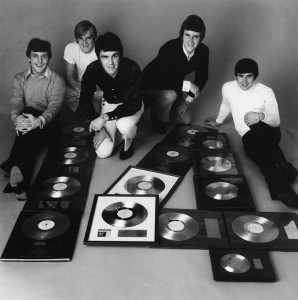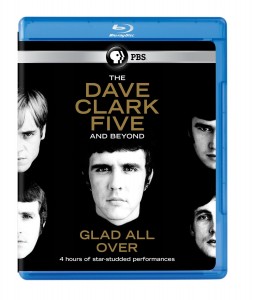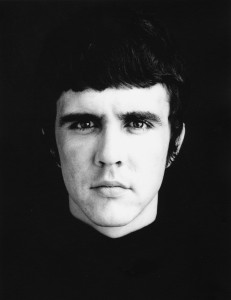Interview: Dave Clark of the Dave Clark Five
Posted on June 10, 2014 at 3:59 pm
It was a tremendous thrill to speak to Dave Clark, from the Dave Clark Five, one of the greatest pop groups of all time. Their string of classic hits include “Glad All Over,” “Bits and Pieces,” “Because,” and “Catch Us If You Can.” He talked to me about his days with the group and the hit play he created after the group disbanded.
And I am very excited to have a copy of the new DVD Dave Clark Five & Beyond: Glad All Over to give away. To enter, send an email to moviemom@moviemom.com with Dave Clark in the subject line and tell me your favorite song from the 60’s. Don’t forget your address! (U.S. addresses only) I will pick a winner at random on June 20, 2014. Good luck!
The movie you and the group made, Having A Wild Weekend, was on television last night as part of a British Invasion tribute. I was surprised how somber, even melancholy, it was, while the others were all light-hearted, even silly.
It different. We didn’t want to make a musical. It was really about the industry really, about how people are used and exploited sometimes and I thought that was quite exciting to do that.
You were very different from the other groups at the time in the way you approached the business side of pop music. Where did that come from?
I left school at 15 years of age, I wasn’t academic at all. You can say really in a way it was by accident because we started from nothing and then gradually you build up your following and became better. Then we ended doing what they call the Mecca Circuit which was in the documentary, we started from nothing then all of a sudden we were packing in six thousand people a night, three or four nights a week and never repeating a song and doing a lot of our own material and of course we got several offers for recording contract. One of them was with Decca Records and they were the company that turned down The Beatles actually. We went down and we had to do an audition which we passed it and we were ready to sign an agreement and then they said to me, “We have this new hit producer. Why don’t you come down and see what’s it like to work with him because this is who we will get to produce your records?” So we went down and the first thing he said to me was, “You’re not recording any of your own material, this is what you’re going to do”. And they were making us into what was the “flavor of the month” which was in those days Cliff Richards and the Shadows in the UK. And I thought “forget it” and I said to the guys, “When we can get some money we’ll make our own records.” We didn’t have any money, though.
And we were packing in 6000 a night with our own style. Surely any record company could say, “Let’s try something new. It’s different.” EMI Records was also one of the handful of people that were chasing us. And I said to them, “Look, if I can produce the records myself I will pay for them,” and that’s what threw them. I didn’t know how I was going to pay for it. Fortunately I was a Black Belt and I was doing karate and combat and all that since I was about 8 years of age and I got a job to crash a car for three nights as a stunt man and that’s how it came up. It wasn’t monetary, I mean you go and get the best deal you can. I went in asking for four times the going rate. I found out what the going rate was for independent producers and I thought, “Well, if I ask for four times the rate, and get what everybody else is getting and they won’t think I was a pushover.” And to my amazement, they agreed to pay me that because they didn’t look on the long-term, there was no longevity. You might get one or two hit records and then on to the next person.
And I am sure they felt that about the Beatles and everybody else. In those days, everything was disposable, for the short term. And I think that is how it all happened. But I think it is very important to control your own destiny. In those days record companies had it deals with publishers so they would publish whatever they got cut off. We did not want that.
So that’s why it happened. It was in the days when we were selling 180,000 a day and we were still at number two because of the Beatles were at number one. We would have to sell 1.5 million to knock them off the number one spot because it was their biggest ever selling single, “She Loves You.” And we ended up doing 2.5 million with “Glad All Over.” You could get a number one today on thousands.
I have always said to people and I am not trying to be modest, if “Glad All Over” had been three months earlier or three months later, it might still have gotten number one. But that’s a thing called luck and it’s being in the right place at the right time. It wasn’t planned. Ed Sullivan phoned me in February of 64. I didn’t know who he was. Who knew? The Beatles didn’t know, we didn’t know. To me, America was the land of dreams. It’s where all our musical icons came from. We were really playing America music. I always believed in putting your own slant on it and making it your own but without American music there would not have been a British invasion.
https://www.youtube.com/watch?v=HO7I-mQBpYcWhat is the difference between the Mersey Sound from Liverpudlian groups like The Beatles and the Tottenham Sound from the London groups like the Dave Clark Five?
In those days all the groups, the Beatles and The Rolling Stones even and all the Mersey groups, it was really three guitars — bass guitar, rhythm guitar, lead guitar, drums. I was always influenced by Fats Domino. So we had keyboards which in those days was an organ with Mike and Dennis on sax as well as guitar, bass and drums, which gave you a much bigger sound and also gave you more flexibility to do a lot of other things like lots of instrumentals. The sax gave it a sort of like an undercarriage in a way that made it very weighty with the drums.
You appeared on the Ed Sullivan Show more than any other group.
Yeah, 18 times.
Who did you meet backstage, anyone interesting?
Richard Rodgers, one of the greatest composers. In fact, he wasn’t on the show. He came to watch us at rehearsals and he stayed on for the show. That blew me away. You had all the great American greats: Jack Benny, John Wayne, it was total that mix and match, Richard Burton doing “Camelot” or whatever.
 You can see in the documentary that the group really seem to enjoy live performance.
You can see in the documentary that the group really seem to enjoy live performance.
Oh, we were a live band.
It was actually going out there on stage. It was wonderful! I always had to laugh or smile when you get other big names or contemporaries saying, “What was it like going out on stage?” “Oh, it’s okay”, whatever. To me, it’s like being heavyweight champion of the world for that hour or so that you’re onstage because you have to work the audience. It’s a bit like I suppose a pied piper; you bring them up and know when to bring them down and to bring them up again. It’s exciting and that comes through experience of playing the dives in the early days and getting beer cans thrown at you when you weren’t very good and then you win an audience over. We ended up on the biggest ballroom circuit in the UK and that covered Wales, Scotland, Ireland and they used to cater for 1 million people a week, which is a lot, over 1 million people and employed over 200 bands a week and we got to the Gold cup in 1963 for being the best live band in the UK which was a great for us! It was really good!
I loved the part in the documentary about your innovative, immersive, four-dimensional production called “Time.” How did that come about?
Originally in the 60s when the Beatles said it all with it the way we all felt; the answer really and a lot of people think it’s corny but it’s love and peace. I didn’t get into that because The Beatles did it admirably with “All you need is love” and John Lennon with “Imagine” and all those wonderful songs. We called it a day while we were still selling millions of records. It’s best if you can stop at the top. And there were other things I wanted to do.
So I took off and went around the world. And I had this idea of the feeling of peace and love and that there would be another planet billions of light-years away where everything was timeless, ageless, no violence nothing and that’s how it came about. So the most important thing is to write the songs and that started and then to make sure that I wasn’t too close to it, I played it for Stevie Wonder, which it says in the documentary. And he liked it. I wanted to make it different. I felt that in those days theater was very straight in a way. I felt the action should be like a movie where it’s exciting and you actually make people a part of the movie so we transformed to the theater so when it like a rock concert. And when the audience got transported up into the universe. The whole theater changed and became like a planetarium and a flying saucer came out of the air that was 50 feet wide and it exploded. I wanted to do all the things so the audience felt that they were in the movie or in the music. The most important thing for me was I wanted a godlike figure that wasn’t necessarily God; it is what everybody believed is a loving God, your favorite uncle, giving words of wisdom. That was another high in my life, working with the great Sir Laurence Olivier. When he spoke, there was 250 little speakers all around the theater. It was like God, all amazing! It was all around. And it was very, very spiritual. And to mix the two; if it had just been spiritual, you might have lost your audience but if you could mix the two and make people stop and think and they take the message in, then you’ve done your job. It’s combining the two and it was very enlightening and very rewarding I felt.
I particularly enjoyed in the documentary the scenes with you and Freddie Mercury. It looks like you had a wonderful friendship.
Oh we did. Sadly I was the only one with him when he passed away; which is very, very sad. He was great! He had an amazing personality. If you watch DVD 2 and you see the interview, we just hit it off and I didn’t think we would. I wanted Freddie on the album but everybody said he was a nightmare to work with. As I said, I’m a perfectionist and Freddie was, too, but it worked. When you get people like that, you give and take to get to the end result to be good; it’s not egotistical in any way. And I found him an absolute dream to work with and he was the only performer I’ve ever known that I’ve actually worked with you could go for 12 hours and he just gives you 100 percent every take.


